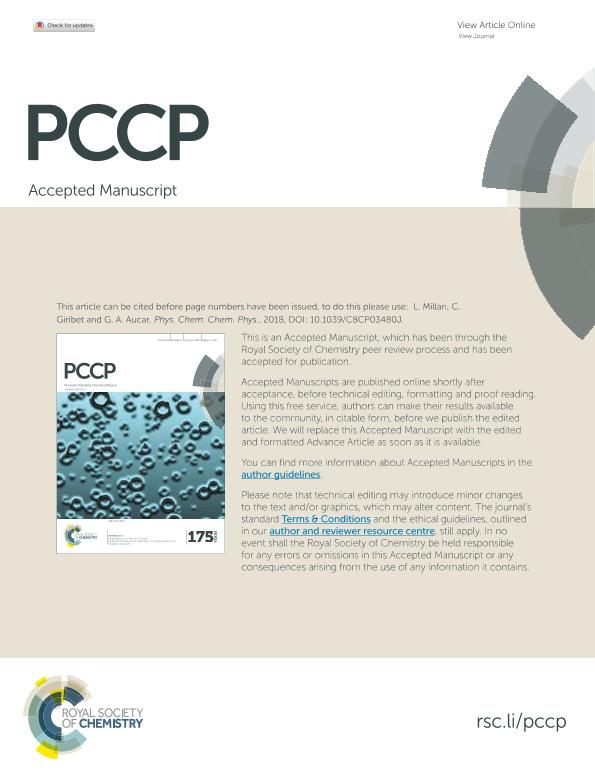Mostrar el registro sencillo del ítem
dc.contributor.author
Millán, Leonardo Andrés

dc.contributor.author
Giribet, Claudia Gloria

dc.contributor.author
Aucar, Gustavo Adolfo

dc.date.available
2019-10-21T18:26:56Z
dc.date.issued
2018-09
dc.identifier.citation
Millán, Leonardo Andrés; Giribet, Claudia Gloria; Aucar, Gustavo Adolfo; Polarization propagator theory and the entanglement between MO excitations; Royal Society of Chemistry; Physical Chemistry Chemical Physics; 20; 38; 9-2018; 24832-24842
dc.identifier.issn
1463-9076
dc.identifier.uri
http://hdl.handle.net/11336/86680
dc.description.abstract
Entanglement is at the core of quantum physics and so, one may conjecture that it should have some influence on atomic and molecular response properties. The usual way of treating entanglement is by applying information theory via the von Newman entropy. Given that the principal propagator is the operator that contains the physical information that arises due to the transmission of the effects of two external perturbations through the electronic framework of a quantum system, it should have in it the information necessary to quantify the likely entanglement among molecular orbital excitations. In this article we first propose a proper density matrix and from it, the way to quantify entangled excitations by using information theory. The NMR J-couplings are among the best candidates to learn about the potentialities of this formalism. We applied this new tool to analyze the famous Karplus rule and found a relationship between the dihedral angular dependence and the entanglement. We also found that the entangled excitations are related to electron correlation. The new formalism can be applied to all other response properties.
dc.format
application/pdf
dc.language.iso
eng
dc.publisher
Royal Society of Chemistry

dc.rights
info:eu-repo/semantics/openAccess
dc.rights.uri
https://creativecommons.org/licenses/by/2.5/ar/
dc.subject
POLARIZATION PROPAGATOR
dc.subject
ENTANGLEMENT
dc.subject
KARPLUS
dc.subject
MO EXCITATIONS
dc.subject.classification
Física Atómica, Molecular y Química

dc.subject.classification
Ciencias Físicas

dc.subject.classification
CIENCIAS NATURALES Y EXACTAS

dc.title
Polarization propagator theory and the entanglement between MO excitations
dc.type
info:eu-repo/semantics/article
dc.type
info:ar-repo/semantics/artículo
dc.type
info:eu-repo/semantics/publishedVersion
dc.date.updated
2019-10-18T15:46:07Z
dc.identifier.eissn
1463-9076
dc.journal.volume
20
dc.journal.number
38
dc.journal.pagination
24832-24842
dc.journal.pais
Reino Unido

dc.description.fil
Fil: Millán, Leonardo Andrés. Consejo Nacional de Investigaciones Científicas y Técnicas. Centro Científico Tecnológico Conicet - Nordeste. Instituto de Modelado e Innovación Tecnológica. Universidad Nacional del Nordeste. Facultad de Ciencias Exactas Naturales y Agrimensura. Instituto de Modelado e Innovación Tecnológica; Argentina
dc.description.fil
Fil: Giribet, Claudia Gloria. Consejo Nacional de Investigaciones Científicas y Técnicas. Oficina de Coordinación Administrativa Ciudad Universitaria. Instituto de Física de Buenos Aires. Universidad de Buenos Aires. Facultad de Ciencias Exactas y Naturales. Instituto de Física de Buenos Aires; Argentina
dc.description.fil
Fil: Aucar, Gustavo Adolfo. Consejo Nacional de Investigaciones Científicas y Técnicas. Centro Científico Tecnológico Conicet - Nordeste. Instituto de Modelado e Innovación Tecnológica. Universidad Nacional del Nordeste. Facultad de Ciencias Exactas Naturales y Agrimensura. Instituto de Modelado e Innovación Tecnológica; Argentina
dc.journal.title
Physical Chemistry Chemical Physics

dc.relation.alternativeid
info:eu-repo/semantics/altIdentifier/doi/http://dx.doi.org/10.1039/c8cp03480j
dc.relation.alternativeid
info:eu-repo/semantics/altIdentifier/url/https://pubs.rsc.org/en/content/articlelanding/2018/CP/C8CP03480J#!divAbstract
Archivos asociados
